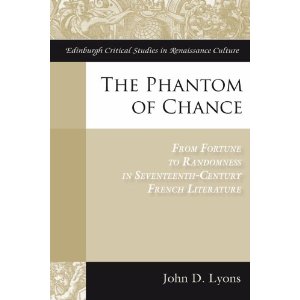
J. D. Lyons, The Phantom of Chance. Form Fortune to Randomness in Seventeenth-Century French Literature
Compte rendu publié dans Acta fabula : "La fortune & le hasard au xviie siècle" par Enrica Zanin.
***
John D. Lyons, The Phantom of Chance. Form Fortune to Randomness in Seventeenth-Century French Literature
Édinbourg : Edinburgh University Press, coll. "Edinburgh Critical Studies in Renaissance Culture", 2011.
EAN 9780748645152
240 p.
Prix 65£
Présentation de l'éditeur :
How the classical and medieval conceptions of Fortune shifted to the modern notion of chance
Is chance nothing more than a projection of human desire on to the world?
In this fascinating new study, John Lyons argues that the idea of chance assumed new vigour in the late Renaissance, when converging philosophical and literary currents demystified the powerful concept of Fortune, sensitizing writers to the relationship between human desire and the world’s apparent randomness.
Up to now, the story of chance has been written by historians of mathematical thought and has focused on calculation, probability and gambling. Lyons, by contrast, highlights the ethical, aesthetic and even erotic aspects of chance. He offers detailed readings of the works of major French authors - Montaigne, Corneille, Lafayette, Scudéry, Pascal, Racine, Bossuet, and La Bruyère.
Key Features
- Renews our understanding of romance, tragedy, comedy & religious polemic in the light of the changed conceptions of the fortuitous
- Shows how the emergence of suspense and subjective interest are linked to the shift from Fortune to randomness
- Proposes a new view on how religious writers, faced with the sceptical challenge of late Renaissance thought, integrated chance into the post-Reformation mainstream of Catholic teachings